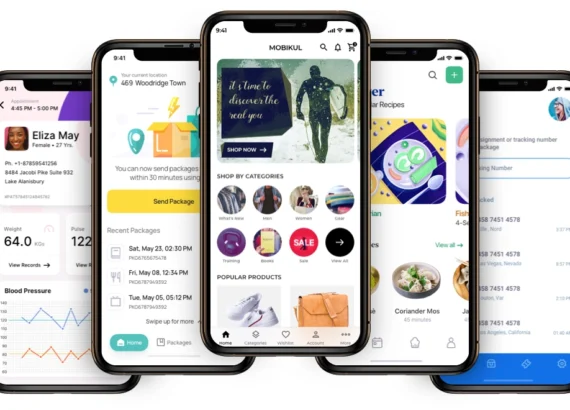Why Mobile Apps Are Significant For Your Business
In today’s digital age, mobile apps have become pivotal for businesses of all sizes and industries. The rapid proliferation of smart phones and the increasing reliance on mobile devices have transformed the way customers interact with businesses. Mobile apps offer a multitude of benefits, from enhancing customer engagement and experience to boosting sales and revenue. This article explores why mobile apps are crucial for businesses and how they can be leveraged to expand market reach, streamline operations, and unlock new opportunities. Let’s delve into the world of mobile apps and discover their immense potential for driving business growth. Read here about the competition by harnessing the power of mobile technology.
1. Introduction: The Growing Importance of Mobile Apps in Business
The Shift towards Mobile: A Game-Changer for Businesses
Gone are the days when having a website was enough for businesses to make their mark in the digital world. The advent of smartphones has changed the game entirely, and mobile apps have become the new gold standard for businesses looking to stay ahead of the competition. With more and more people relying on their smartphones for everything from shopping to entertainment, mobile apps have emerged as a powerful tool for engaging customers and driving sales.
The Rising Popularity of Mobile Apps
It’s no secret that mobile apps have taken the world by storm. From social media platforms to e-commerce giants, businesses of all sizes and industries are embracing mobile apps as a way to connect with their customers on a deeper level. With over 3.8 million apps available on Google Play and the Apple App Store combined, it’s clear that consumers are hooked on the convenience and functionality that mobile apps offer. So, if you want your business to thrive in today’s digital landscape, having a mobile app is no longer a luxury – it’s a necessity.

2. Enhancing Customer Engagement and Experience through Mobile Apps
Creating Interactive User Interfaces
When it comes to mobile apps, user experience is king. A well-designed and intuitive user interface can make all the difference in keeping your customers engaged and coming back for more. By offering a seamless and interactive experience, mobile apps enable businesses to capture the attention of their target audience and keep them hooked.
Push Notifications for Direct Customer Interaction
Push notifications the power to send real-time updates, promotions, and personalized messages directly to their smart phones, push notifications enable businesses to stay top of mind and drive engagement. Whether it’s reminding customers about a special offer or announcing the launch of a new product, push notifications are a surefire way to keep your customers in the loop.
Personalization and Customization Features
One size does not fit all, especially when it comes to customer preferences. Mobile apps allow businesses to offer personalized experiences tailored to each user. From recommending products based on past purchases to allowing users to customize their app settings, personalization features make customers feel valued and understood. By catering to their unique needs and preferences, businesses can foster stronger relationships and turn customers into loyal brand advocates.

3. Boosting Sales and Revenue with Mobile App Integration
Mobile Commerce: The Power of In-App Purchases
The rise of mobile commerce, or m-commerce, has created new opportunities for businesses to generate revenue. With mobile apps, customers can browse and make purchases with just a few taps on their screens. By integrating in-app purchasing capabilities, businesses can provide a seamless and convenient shopping experience, ultimately boosting sales and driving revenue.
Efficient Mobile Payment Systems
Mobile apps have made payment transactions faster and more convenient than ever before. With secure and efficient mobile payment systems, businesses can offer a variety of payment options, such as credit cards, mobile wallets, or even cryptocurrency. By removing friction from the payment process, businesses can increase conversions and reduce cart abandonment rates.
Loyalty Programs and Rewards for Increased Sales
Who doesn’t love rewards? Mobile apps provide the perfect platform for businesses to implement loyalty programs and reward their customers for their loyalty. From exclusive discounts to special promotions, loyalty programs incentivize customers to keep coming back, driving repeat purchases and increasing sales. By fostering a sense of appreciation and value, businesses can cultivate a loyal customer base that will keep their revenue flowing.

4. Expanding Market Reach and Accessibility with Mobile Apps
Reaching a Wider Audience through App Stores
App stores have become the go-to destination for smartphone users looking for new apps. By listing your mobile app on popular app stores like Google Play and the Apple App Store, businesses can reach a wider audience and tap into a global market. App store optimization techniques can also help businesses improve their app’s visibility and attract more potential customers.
Cross-Platform Compatibility and Accessibility
Gone are the days when businesses had to choose between developing separate apps for different platforms. With cross-platform compatibility, businesses can ensure that their app works seamlessly across various operating systems, including iOS and Android. This not only maximizes their market reach but also makes their app accessible to a larger audience. Localization and International Expansion Opportunities
Mobile apps provide businesses with the opportunity to expand their reach beyond their local market. By offering localization features, such as language selection and region-specific content, businesses can cater to a global audience and tap into new markets. Whether it’s translating their app into different languages or adapting it to suit cultural preferences, mobile apps enable businesses to go global with ease.
So, if you want your business to stay competitive in today’s digital age, it’s time to embrace the power of mobile apps. From enhancing customer engagement to boosting sales and expanding market reach, mobile apps have become a vital tool for businesses looking to thrive in the mobile-first world. So don’t miss out on the mobile revolution – get app-absolutely amazing today!

5. Leveraging Mobile Apps for Effective Branding and Marketing
Building a Strong Brand Identity through App Design
Your mobile app design should reflect your brand’s personality and values. From the choice of colors to the overall user experience, every element should align with your brand identity. This will not only create a memorable impression but also establish trust and credibility among your target audience.
Incorporating Social Media Integration for Viral Marketing
Social media integration within your mobile app allows users to easily share their experiences and achievements with their friends and followers. This can lead to viral marketing, as positive word-of-mouth spreads like wildfire. By incorporating social sharing features, you can amplify your brand’s reach and generate organic publicity.
Collecting User Feedback and Reviews for Brand Improvement
Mobile apps provide a convenient platform for users to provide feedback and leave reviews. By actively listening to your users and addressing their concerns, you can continuously improve your brand and refine your products or services. User feedback is invaluable for identifying areas of improvement and building a loyal customer base.

6. Streamlining Operations and Improving Efficiency with Mobile App Solutions
Mobile Apps for Internal Communication and Collaboration
A dedicated mobile app can enhance internal communication and collaboration among your team members. With features like instant messaging, file sharing, and task management, everyone can stay connected and work more efficiently, regardless of their location. This streamlines operations and ensures that everyone is on the same page.
Automating Business Processes through Mobile Apps
Mobile apps can automate various business processes, freeing up valuable time and resources. Whether it’s automating appointment scheduling, order processing, or inventory management, these apps can enhance efficiency and reduce human error.
Inventory Management and Supply Chain Optimization
Mobile apps can revolutionize your inventory management and supply chain processes. With real-time updates and notifications, you can track inventory levels, manage orders, and streamline the entire supply chain. This reduces wastage, eliminates stockouts, and ensures timely deliveries, ultimately saving costs and improving customer satisfaction.

7. Harnessing Customer Data and Insights through Mobile Apps
Data Analytics and Tracking User Behavior
With analytics tools, you can track how users interact with your app, understand their preferences, and identify trends. This data can inform your marketing strategies, product enhancements, and overall business decisions.
Utilizing Geolocation and User Preferences for Targeted Marketing
Mobile apps can utilize geolocation and user preferences to deliver personalized and targeted marketing campaigns. By understanding where your users are and what they are interested in, you can tailor promotional offers, notifications, and content specifically for them. This enhances engagement and improves the effectiveness of your marketing efforts.
Improving Decision-Making with Customer Data Insights
The data collected through mobile apps can provide valuable insights for decision-making. By analyzing user behavior, feedback, and purchasing patterns, you can make informed decisions about product development, marketing strategies, and customer service improvements. This data-driven approach increases the likelihood of success and minimizes risks.

8. The Future of Mobile Apps in Business: Emerging Trends and Opportunities
Integration of Artificial Intelligence and Machine Learning
The integration of artificial intelligence and machine learning in mobile apps presents exciting opportunities for businesses. From chatbots that provide personalized customer support to predictive analytics that anticipate user needs, these technologies can enhance user experiences and streamline various business processes.
Applications of Augmented Reality (AR) and Virtual Reality (VR)
AR and VR applications can transform how businesses engage with customers. From virtual try-ons for fashion brands to interactive product demonstrations, these technologies create immersive experiences that drive customer engagement and conversions. As AR and VR continue to advance, their potential in business applications is limitless.
Internet of Things (IoT) Integration for Smart Business Solutions
IoT integration allows mobile apps to connect with smart devices and gather real-time data. This enables businesses to automate processes, monitor equipment performance, and optimize resource usage. From smart homes to industrial automation, IoT integration in mobile apps opens up possibilities for smarter, more efficient business solutions.
Conclusion
As the digital landscape continues to evolve, it is evident that mobile apps have become an essential tool for businesses to thrive in a competitive market. By harnessing the power of mobile apps, businesses can enhance customer engagement, boost sales, expand market reach, streamline operations, and harness valuable customer data. Embracing this technology is no longer a luxury, but a necessity for businesses looking to stay ahead. So, whether you are a small startup or a multinational corporation, investing in a mobile app can be a game-changer that propels your business toward success. Leap into the mobile app world and unlock the endless possibilities it offers for your business.

FAQ
1. Are mobile apps only beneficial for large businesses?
While larger businesses may have more resources to invest in app development, smaller businesses can also benefit from mobile apps by enhancing customer engagement, streamlining operations, and expanding their market reach.
2. Do I need technical expertise to develop a mobile app for my business?
Not necessarily. While having technical knowledge can be advantageous, there are various app development platforms and services available that cater to businesses without extensive technical expertise. These platforms offer user-friendly interfaces and templates, allowing businesses to create their mobile apps without coding knowledge.
3. How can a mobile app help improve customer experience?
A mobile app can significantly enhance customer experience by offering features such as personalized content, push notifications, and easy access to information and services. Mobile apps provide a convenient and seamless platform for customers to interact with businesses, leading to improved customer satisfaction and loyalty.
4. Are mobile apps only useful for businesses in specific industries?
No, mobile apps can benefit businesses across various industries. Whether you run a retail store, a restaurant, a service-based business, or even an e-commerce platform, a well-designed and functional mobile app can enhance your brand presence, improve customer engagement, and drive business growth.
Thank you for reading 🙂


















